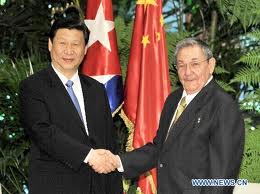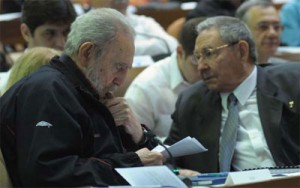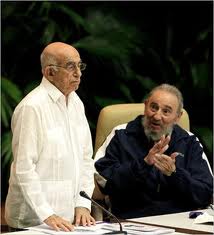INTELECTUALES CUBANOS PIDEN A RAUL CASTRO QUE COPIE EL MODELO CHINO.
‘Muchos cubanos de EEUU invertirían a través de sus parientes cubanos, y todo eso lo supervisará el Partido Comunista’, dice Guillermo Rodríguez Rivera. Al mismo tiempo, Silvio Rodríguez declaró : ‘Para nada creo que el hecho de que inviertan cubanos de acá sería como declararnos capitalistas’.
La exclusión del incipiente sector privado cubano de la nueva Ley de Inversión Extranjera busca impedir que resurja una “burguesía nacional” que pueda desafiar al sistema comunista, opinan intelectuales e instan al general Raúl Castro a aceptar ese reto, como China y Vietnam, reporta AFP.
“Acabemos de aflojar la retranca, antes de que se rompa. A lo mejor llegamos a generar una burguesía nacional patriota. ¿Qué tiene de extraño en el complicado mundo en el que vivimos? Una vez la tuvimos”, dijo el ensayista Guillermo Rodríguez Rivera, en un artículo publicado en el blog del cantautor Silvio Rodríguez.
Esta exclusión contenida en la ley aprobada hace tres semanas generó críticas entre intelectuales afines al Gobierno.
La ley, que da beneficios tributarios a los inversionistas, incluso “favorece” a los cubanos emigrados, pues para invertir solo se exige tener “domicilio y capital en el extranjero”. Sin embargo, el gobierno dijo que “no irá a buscar inversión extranjera a Miami”.
“Si no lo permitimos, le prohibiremos invertir a los cubanos de Cuba mientras el gobierno yanki se lo prohíbe a los cubanos que viven allí. Bloquearemos aquí como los yankis bloquean allá”, afirmó Rodríguez Rivera.
Silvio: ‘Invertir no es ser capitalistas‘
Por su parte, Silvio Rodríguez en su blog: “Para nada creo que el hecho de que inviertan cubanos de acá sería como declararnos capitalistas. Eso es un sofisma”, escribió
“Las de Cuba son medidas económicas capitalistas dentro de un sistema socialista de distribución y por lo tanto bajo el control del gobierno socialista”, agregó el cantautor, uno de los primeros capitalistas del país, a pesar de declararse “comunista”.
El Gobierno justifica la exclusión destacando que los privados no cuentan “con los recursos suficientes para lograr el crecimiento de la economía”, pero el politólogo Jorge Gómez Barata, exfuncionario del Departamento Ideológico del Partido Comunista (único), afirmó que el aporte de ellos es “decisivo” para la economía.
“La respuesta al problema de la incapacidad inversora de los cubanos de la Isla no puede ser excluirlos de facto y de jure, sino ayudarlos a incorporarse a ese proceso, que es decisivo para la nación y el socialismo”, dijo en un comentario enviado a la AFP.
Fidel Castro acabó con los propietarios privados en Cuba al nacionalizar en 1960 las grandes empresas. Además, en 1968 estatizó los pequeños negocios, en la llamada “ofensiva Rrevolucionaria”.
Cuestión de lineamientos
La negativa del Gobierno se enmarca en el Lineamiento 3 de las reformas aprobadas por el VI Congreso del Partido: “En las formas de gestión no estatal no se permitirá la concentración de la propiedad en personas jurídicas o naturales”.
El vicepresidente Marino Murillo, a cargo de las reformas, dijo que adoptaron esa decisión “para que no se produzca la concentración de la propiedad”, pero los intelectuales creen que esta medida frena el despegue de la estancada economía nacional.
La “prevención de invertir (solo) en pequeños negocios privados y las críticas a la concentración de la propiedad (…) han dañado la marcha de la reforma, no solo por los negocios que han impedido, sino también por las señales que envía”, dijo Arturo López-Levy, un académico cercano al régimen.
“Se envía la desafortunada señal de que las autoridades no están convencidas aún de la inviabilidad de una economía de comando” centralizado, indicó López-Levy en declaraciones enviadas a la AFP.
“Tales proyecciones perjudican al ciudadano no solo en términos de sus derechos, sino también al limitar el desarrollo nacional”, agregó.
Muchos empresarios, un solo Partido
Rodríguez Rivera cree que incluir a los privados ayudaría a “burlar” el embargo estadounidense, vigente desde 1962.
“Sería, entre otras cosas, una manera de burlar el empecinado bloqueo imperialista, porque muchos cubanos de Estados Unidos invertirían a través de sus parientes cubanos, y todo eso lo supervisaría el Partido Comunista, como está haciéndolo en China o Vietnam”, dijo.
Para Gómez Barata, incluir a los privados ayudaría a crear “una clase media urbana y un campesinado”, en donde el trabajador “no será más un labriego, sino un empresario”.
“Los partidos gobernantes de China y Vietnam han asimilado los cambios operados, no solo en las relaciones de producción, sino también en las estructuras y dinámicas sociales (…) Su experiencia no es una receta, aunque sí una referencia”, acotó.
DDC/Agencies/Internetphotos/www.thecubanhistory.com
Intelectuales piden a Raúl Castro que copie el modelo chino.
The CUban History, Hollywood.
Arnoldo Varona, Editor
CUBAN INTELLECTUALS ask Raúl Castro to copy the Chinese Economic model.
‘ Many U.S. Cubans would invest through their Cuban relatives, and all that would be monitored by the Communist Party , “says Guillermo Rodríguez Rivera. At the same time , Silvio Rodríguez said: ‘ I don’t think that invest Cubans here would be like declaring us capitalists ‘ .
The exclusion of the emerging Cuban private sector of the new Foreign Investment Law seeks to prevent resurgence of a “national bourgeoisie ” that can challenge the communist system , say intellectuals and urge the General Raul Castro to accept that challenge, as China and Vietnam , reports AFP .
” Let’s get loosen retranca before it breaks. Maybe we generate a national bourgeoisie patriot. Which is strange in the complicated world in which we live? Once we had it ,” said essayist Guillermo Rodríguez Rivera , in an article published on the blog of singer Silvio Rodriguez .
This exclusion contained in the law passed three weeks ago drew criticism from intellectuals sympathetic to the government.
The law, which gives tax benefits to investors , including ” favors” Cuban émigrés , as required to invest only have ” home and capital abroad .” However, the government said it ” will not go to seek foreign investment to Miami.”
“If we let him invest forbid Cubans from Cuba while the Yankee government prohibits Cubans living there. ‘ll Block here as the Yankees locked there,” Rodriguez said Rivera.
Silvio : ‘ Investing is not capitalist ‘
Meanwhile, Silvio Rodríguez on his blog . ” To think that anything that invest Cubans here would be like declaring capitalist That’s a fallacy ,” wrote
” Those of Cuba are capitalist economic measures within a socialist system of distribution and therefore under the control of the socialist government ,” the singer , one of the first capitalist country , despite declared “communist ” .
The Government justifies the exclusion stressing that private not have ” sufficient resources to achieve economic growth ,” but the political scientist Jorge Gómez Barata, former official of the Ideological Department of the Communist Party ( single ) , said that the contribution of these is “decisive” for the economy.
” The answer to the problem of inverting inability of Cubans on the island can not be excluded de facto and de jure , but to help them join the process, which is crucial to the nation and socialism ,” he said in a comment posted to AFP.
Fidel Castro ended private owners in Cuba in 1960 to nationalize big business. In addition , in 1968 he nationalized small businesses in the ” offensive Rrevolucionaria ” .
Question of guidelines
The refusal of the government is part of the Guideline 3 of the reforms adopted by the Sixth Party Congress : “In non-state forms of management concentration of ownership in legal entities or individuals will not be allowed .”
Vice President Marino Murillo, in charge of reforms, said he made that decision “so that the concentration of ownership does not occur ” , but scholars believe that this measure slows off the stagnant national economy.
“Prevention of investing ( only ) in small private businesses and critical to the concentration of ownership ( … ) have damaged the progress of reform , not only for businesses that have prevented , but also by the signals sent “said Arturo Lopez -Levy , a close academic regime .
Centralized , Lopez -Levy said in statement sent to AFP ” the unfortunate sign that the authorities are not yet convinced of the impossibility of a command economy Ships ” .
” Such statements will harm the city not only in terms of their rights, but also to limit the national development ,” he added .
Many entrepreneurs , one Party
Rodríguez Rivera believed to include private help ” circumvent ” the U.S. embargo , in effect since 1962.
“It would , among other things, a way to circumvent the stubborn imperialist blockade , because many Cubans in the United States invest through their Cuban relatives, and all that it would monitor the Communist Party , as it is doing in China or Vietnam ,” he said .
For Gómez Barata, include private help create ” an urban middle class and peasantry ” where the worker ” will no longer be a farmer , but an entrepreneur .”
” The ruling parties of China and Vietnam have assimilated the changes , not only in the relations of production , but also in the social structures and dynamics ( … ) His experience is not a recipe , although a reference ,” he said .
DDC / Agencies / Internetphotos / www.thecubanhistory.com
Intellectuals ask Raul Castro to copy the Chinese model.
The Cuban History , Hollywood.
Arnoldo Varona , Editor






